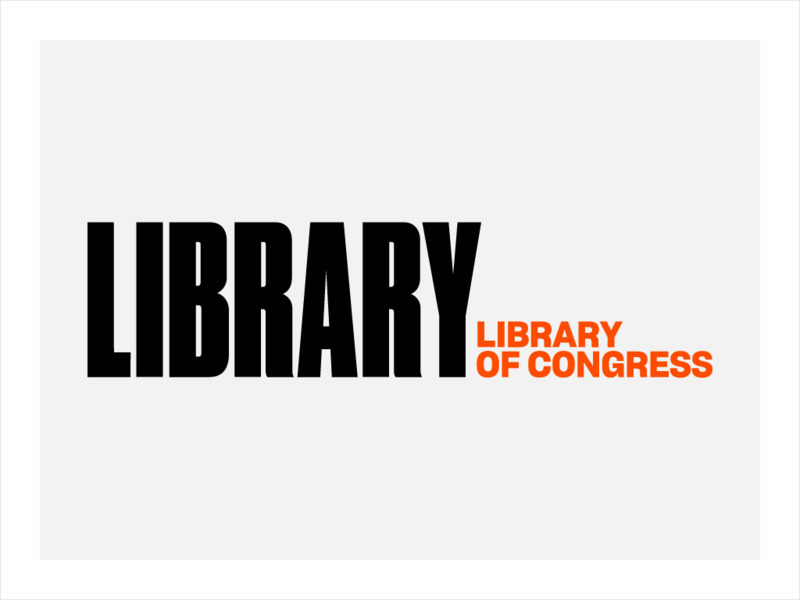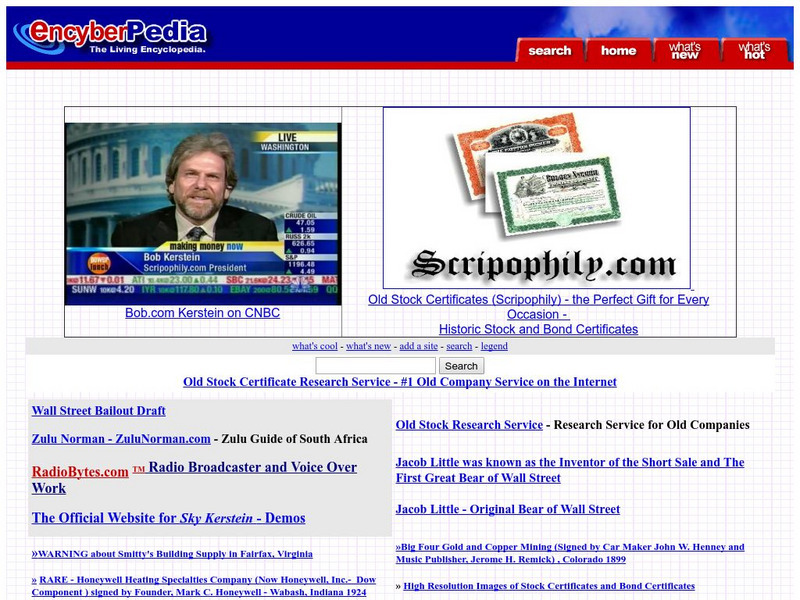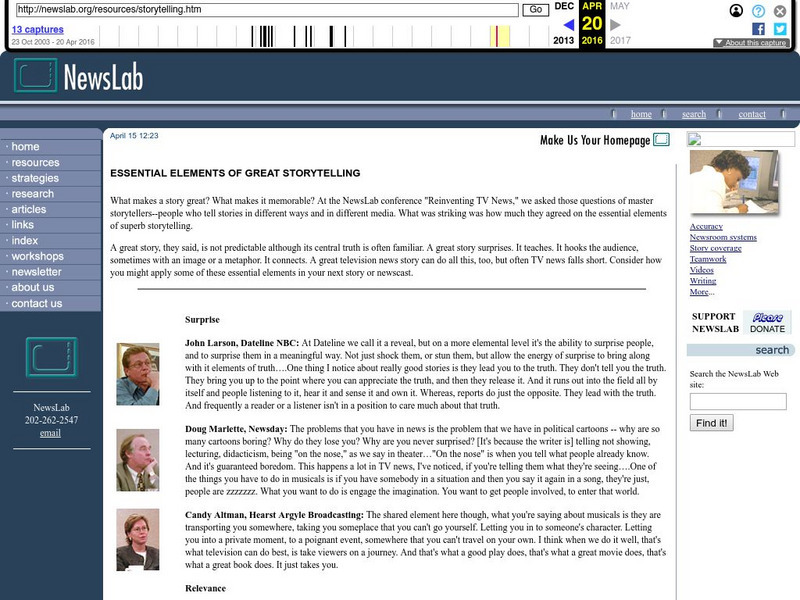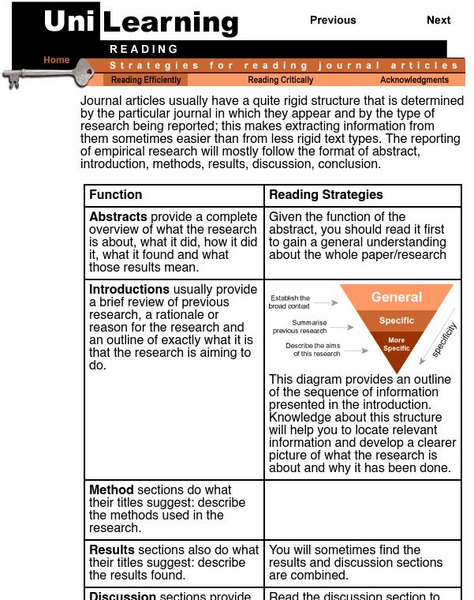Hi, what do you want to do?
George Mason University
George Mason University: World History Sources: Material Culture: Images
Investigate the meaning of different cultures' images and materials. Learn to examine different questions such as what is the image, what is the meaning, what is the function, and what is the social condition.
George Mason University
George Mason University: World History Sources: Material Culture: Objects
Examine different objects from many different cultures. Learn how to decipher what it is, where it came from, what the function is, and who made or owned the object.
George Mason University
George Mason University: World History Sources: Newspapers
Discover how historians use newspapers and learn about the development of the modern newspaper. Get answers to many questions about different newspapers.
National Endowment for the Humanities
Neh: Edsit Ement: Evaluating Eyewitness Reports
In this lesson, students practice working with primary documents by comparing accounts of the Chicago Fire and testing the credibility of a Civil War diary.
Library of Congress
Loc: Creating a Primary Source Archive: All History Is Local
A lesson plan where students collect local primary documents and examine the interplay between national, state, local, and personal history.
Digital History
Digital History: An Intro to the Study of History: The Four Questions [Pdf]
How does one study history? Find four basic questions that historians use to examine events in an effort to explain them and put them in historical context. By examining the Battle of Lexington and Concord, students can practice using...
Library of Congress
Loc: Change in Early 20th Century America: Doing the Decades
This unit provides a flexible investigative structure for the study of selected themes in U.S. history and culture using the American Memory collections and related resources. Core goals are the development of relationships between...
AdLit
Ad lit.org: Classroom Strategies: First Lines
First Lines is a strategy in which students read the beginning sentences from assigned readings and make predictions about the content of what they're about to read. This pre-reading technique helps students focus their attention on what...
AdLit
Ad lit.org: Content Area Literacy: History
The ability to read historical documents including contemporary explications about societal, economic and political issues provides a direct link to literacy as preparation for citizenship. As in the other disciplines, schools are unique...
Other
San State Francisco University: Newsworx (1001 Words)
View the media-rich work of teams of student journalists assigned to produce high-interest feature stories using pictures, audio, and words. Learn how to tell a story well by thinking critically about the different choices made by each...
Other
Web Treasure Hunt: 10 Quest. To Test Newsroom Literacy
This is a great exercise for critical thinking, problem solving and sharpening web search skills. Plenty of explanation accompanies the answers.
Other
Encyber Pedia
An encyclopedia online. Just look for your topic to find information that you need. Provides information on a wide range of topics.
Other
World History Project: Cuneiform
Read a brief history of cuneiform, the most widely used and historically significant writing system of the ancient Middle East. Also learn about how cuneiform spread from one ancient culture to another.
Other
Speech, Music and Hearing: Historical Linguistics
A brief definition of the term historical linguistics and its sub-disciplines. This site is a good starting point for studying and comparing languages
Broward Education Foundation
Broward Education Foundation: Rom N Greece [Pdf]
The ROM N GREECE project provides challenging, yet enjoyable activities that enable students to explore Ancient Greece and Rome. The lessons promote reading, critical thinking and writing skills. Students work in (changeable) small...
Education.com
Education.com: Information Processing Theory
[Free Registration/Login Required] Explains and compares the three types of memory in the information processing model, which are sensory, working, and long-term memory. Implications for teaching are also outlined.
Other
Yukon College: Reading & Writing Academic Articles [Pdf]
This detailed guide provides background information about the purpose and structure of journal articles, then walks the reader step-by-step through the reading process. Additional resources are included.
New York Times
New York Times: Times Machine
Browse PDFs of all issues of the "New York Times" now in the public domain. Includes every edition of the paper published since September 18, 1851, when the paper's first issue was produced, through 1922.
Grammarly
Grammarly Handbook: Primary, Secondary, or Tertiary Resources
Definitions and examples of primary, secondary, and tertiary resources.
Grammarly
Grammarly Handbook: Good or Bad Resource?
This page focuses on how to evaluate resources; it establishes criteria for determining good and bad resources. Primary resources are always good, but secondary and tertiary ones need to be evaluated more closely.
Vocabulary University
My vocabulary.com: Holocaust
This is a collection of vocabulary puzzles and activities using a list of 16 vocabulary words pertaining to the Holocaust. It also provides an extensive wordlist on the topic (368).
Other
News Lab: Elements of Great Storytelling
This is a great site for broadcast journalists; it focuses on the elements that make a story great. You can find tips on writing from some of the top people in the industry.
Microsoft
Microsoft: Map Reading in the 21st Century
Learners learn how to make informed use of new digital mapping information and tools. Learners create hands-on learning experiences for understanding the relevance of maps. The lesson plan consists of student activities, resources,...
Other
Uni Learning: Strategies for Reading Journal Articles
Clear explanation of how journal articles tend to be structured, as well as tips for extracting information from each part. Includes sample, color-coded exercises.






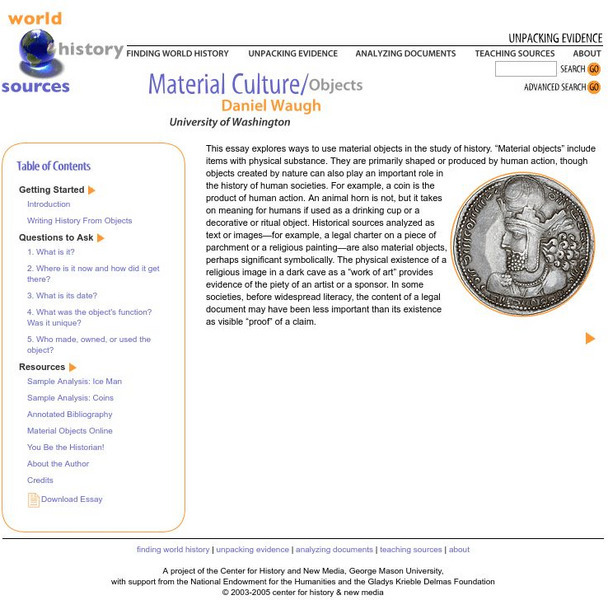

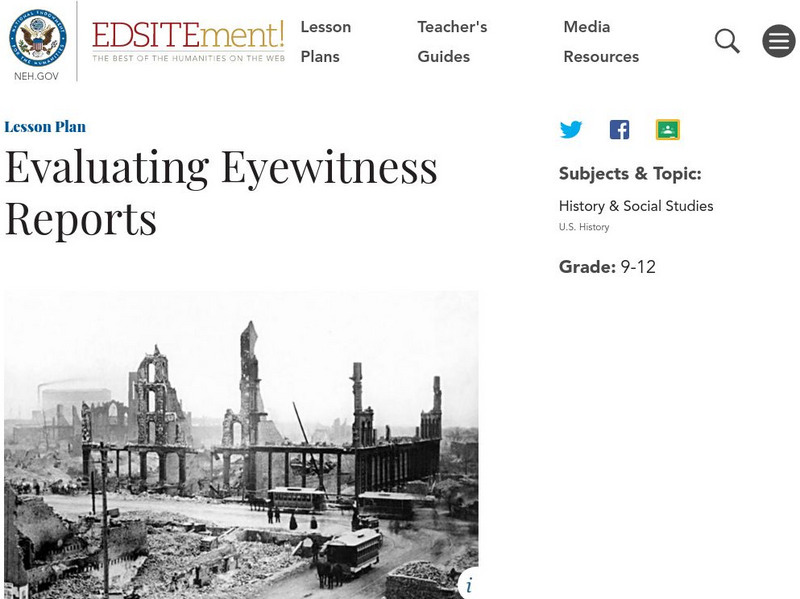

![Digital History: An Intro to the Study of History: The Four Questions [Pdf] Website Digital History: An Intro to the Study of History: The Four Questions [Pdf] Website](https://static.lp.lexp.cloud/images/attachment_defaults/resource/large/FPO-knovation.png)
